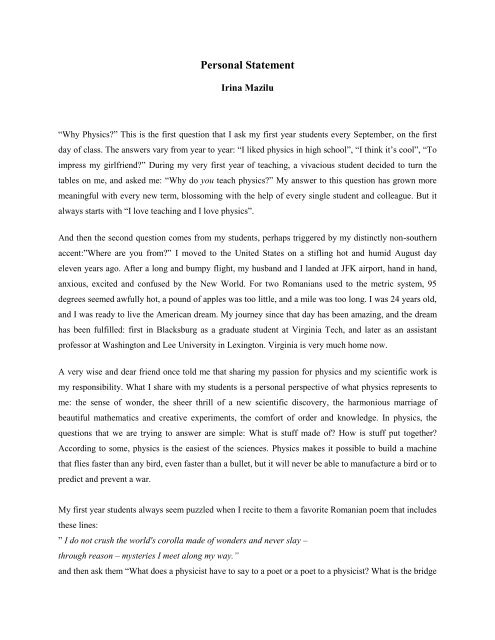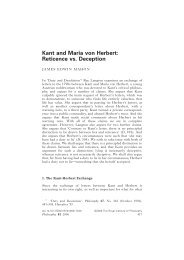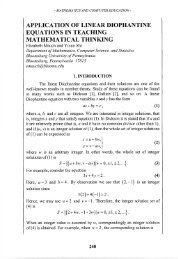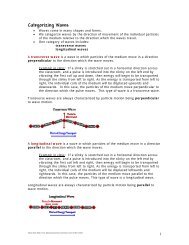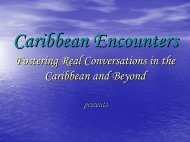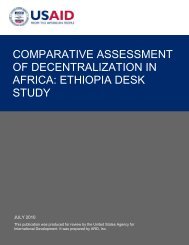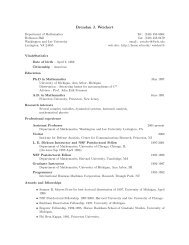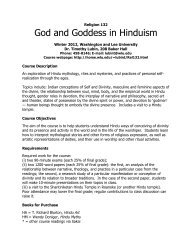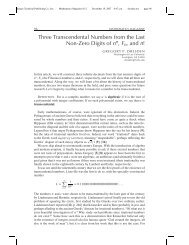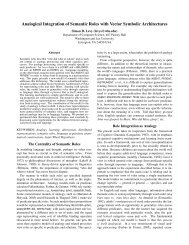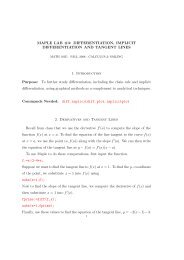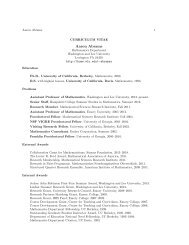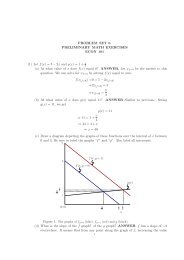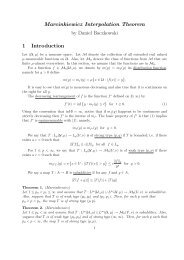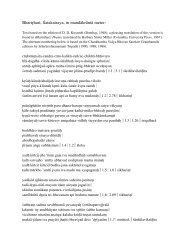Irina Mazilu - Personal Statement - Washington and Lee University
Irina Mazilu - Personal Statement - Washington and Lee University
Irina Mazilu - Personal Statement - Washington and Lee University
Create successful ePaper yourself
Turn your PDF publications into a flip-book with our unique Google optimized e-Paper software.
<strong>Personal</strong> <strong>Statement</strong><br />
<strong>Irina</strong> <strong>Mazilu</strong><br />
“Why Physics” This is the first question that I ask my first year students every September, on the first<br />
day of class. The answers vary from year to year: “I liked physics in high school”, “I think it’s cool”, “To<br />
impress my girlfriend” During my very first year of teaching, a vivacious student decided to turn the<br />
tables on me, <strong>and</strong> asked me: “Why do you teach physics” My answer to this question has grown more<br />
meaningful with every new term, blossoming with the help of every single student <strong>and</strong> colleague. But it<br />
always starts with “I love teaching <strong>and</strong> I love physics”.<br />
And then the second question comes from my students, perhaps triggered by my distinctly non-southern<br />
accent:”Where are you from” I moved to the United States on a stifling hot <strong>and</strong> humid August day<br />
eleven years ago. After a long <strong>and</strong> bumpy flight, my husb<strong>and</strong> <strong>and</strong> I l<strong>and</strong>ed at JFK airport, h<strong>and</strong> in h<strong>and</strong>,<br />
anxious, excited <strong>and</strong> confused by the New World. For two Romanians used to the metric system, 95<br />
degrees seemed awfully hot, a pound of apples was too little, <strong>and</strong> a mile was too long. I was 24 years old,<br />
<strong>and</strong> I was ready to live the American dream. My journey since that day has been amazing, <strong>and</strong> the dream<br />
has been fulfilled: first in Blacksburg as a graduate student at Virginia Tech, <strong>and</strong> later as an assistant<br />
professor at <strong>Washington</strong> <strong>and</strong> <strong>Lee</strong> <strong>University</strong> in Lexington. Virginia is very much home now.<br />
A very wise <strong>and</strong> dear friend once told me that sharing my passion for physics <strong>and</strong> my scientific work is<br />
my responsibility. What I share with my students is a personal perspective of what physics represents to<br />
me: the sense of wonder, the sheer thrill of a new scientific discovery, the harmonious marriage of<br />
beautiful mathematics <strong>and</strong> creative experiments, the comfort of order <strong>and</strong> knowledge. In physics, the<br />
questions that we are trying to answer are simple: What is stuff made of How is stuff put together<br />
According to some, physics is the easiest of the sciences. Physics makes it possible to build a machine<br />
that flies faster than any bird, even faster than a bullet, but it will never be able to manufacture a bird or to<br />
predict <strong>and</strong> prevent a war.<br />
My first year students always seem puzzled when I recite to them a favorite Romanian poem that includes<br />
these lines:<br />
” I do not crush the world's corolla made of wonders <strong>and</strong> never slay –<br />
through reason – mysteries I meet along my way.”<br />
<strong>and</strong> then ask them “What does a physicist have to say to a poet or a poet to a physicist What is the bridge
etween the arts <strong>and</strong> the sciences<br />
I am fortunate to work at <strong>Washington</strong> <strong>and</strong> <strong>Lee</strong> <strong>University</strong>, in a liberal arts environment that promotes<br />
these types of questions <strong>and</strong> connections, that encourages <strong>and</strong> nurtures intellectual curiosity <strong>and</strong><br />
creativity, for students <strong>and</strong> faculty alike. Growing up in communist Romania, a country where freedom of<br />
thought <strong>and</strong> travel was not a given, but had to be won through a revolution, makes me appreciate a liberal<br />
arts education even more. I always tell my students how lucky they are to have the opportunity to explore<br />
so many interesting fields <strong>and</strong> to find their calling during their time at W&L.<br />
Over the years, I have learned to appreciate more <strong>and</strong> more the wonderful community that is <strong>Washington</strong><br />
<strong>and</strong> <strong>Lee</strong> <strong>University</strong>. My colleagues <strong>and</strong> friends guided me through the thorny first years of the tenure –<br />
track job, encouraged me to pursue my scientific dreams, supported my ideas of developing new courses<br />
<strong>and</strong> teaching methods. I had the opportunity to build a strong research program, attend national<br />
professional meetings, <strong>and</strong> extend research collaborations. I have learned a lot from my colleagues, <strong>and</strong><br />
became a better teacher <strong>and</strong> scholar. At W&L, I found my own voice.<br />
When I first came to <strong>Washington</strong> <strong>and</strong> <strong>Lee</strong> <strong>University</strong>, I was told that I was the very first woman ever<br />
hired as a professor in the Department of Physics <strong>and</strong> Engineering. I was honored <strong>and</strong> surprised at the<br />
same time, <strong>and</strong> I feel the responsibility to promote the interests of women students in science. I am happy<br />
to see how the number of women interested in physics <strong>and</strong> engineering has grown over the years. Seeing<br />
these young women thrive <strong>and</strong> succeed in a field that is still considered tough <strong>and</strong> male dominated gives<br />
me a great sense of satisfaction.<br />
Ever since I started my job, I have learned from my students <strong>and</strong> colleagues amazing lessons in courage,<br />
dignity, <strong>and</strong> kindness. To paraphrase Kierkegaard, “to be a teacher in the right sense is to be a learner. I<br />
am not a teacher, only a fellow student”. I strive for a life of continuous learning, discovery, service <strong>and</strong><br />
honor, an ideal I encourage my students to emulate each time I walk into the lab or classroom.


